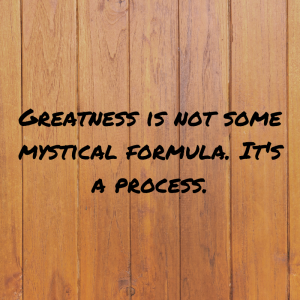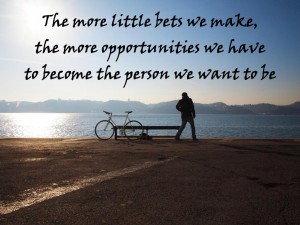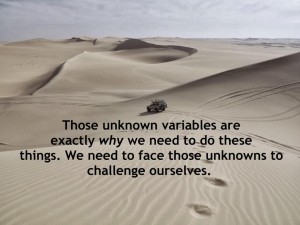It all starts with Why. Simon Sinek explained that in 2009. Why do you do what you do?
It’s a question not all of us can answer. For a long time I couldn’t. I just sort of put my head down & worked my tail off. I was rewarded for it, but in hind sight I was just following orders like a good worker bee.
In the past I’ve written about quitting on your goals and when that’s an honorable thing to lean into. But recently, I have found myself sticking with some goals that I may have quit in the past.
There’s a big difference in quitting because you’re uncomfortable and quitting because you don’t want to commit.
It comes down to your WHY
 Knowing why you set your goals and having conviction about them will make all the difference. If you’re not in love with a goal, why would you push through hard times to achieve it?
Knowing why you set your goals and having conviction about them will make all the difference. If you’re not in love with a goal, why would you push through hard times to achieve it?
If you’re not in love with a goal, why would you sacrifice anything for it?
If you’re not in love with a goal, why are you pursuing it?
If you’re not in love with a goal, why bother?
Answering these questions before you ever put a goal down on paper will help you decide whether or not it’s worth sticking to when times get tough.
Pro football players decide whether or not a season of brutality is worth a potential Lomdardi Trophy in the off-season while life is calm. They don’t decide whether it’s worth it during pre-season camp while their bodies are aching (unless you’re Brett Favre of course).
If you know why you’re getting yourself into something, you will have more conviction to stick to it than if your goal is randomly plucked out of the air. Or worse, if you’re setting certain goals for the wrong reasons.
The Why Behind My Goals
In January I published a few of my goals to make them public knowledge and keep myself accountable. I picked these because they matter to me and will help shape me into who I want to be. I have other financial and personal goals, but these are a couple that I want to put meaning behind to illustrate my point.
Build a TV Stand –
I used to work in the furniture industry and my company sold “cookie-cutter” furniture by the truckloads. Literally AND figuratively. All the furniture in my house came from that company and now that I have divorced myself from them, my furniture reminds me of those days.
Since I want to move on and really enjoy expressing my creativity through wood-working, I am in the laborious process of building a TV stand.
If I give up on the TV Stand before it’s finished, it’s like I’m still attached (yes, that may sound cheesy to you) to the company I’m moving away from. Plus, as a creative person, I do not get satisfaction from starting a bunch of projects without finishing them.
I get satisfaction from shipping finished works.
I talked about creating quality work with this project and it has given me it’s share of headaches to smooth over. But ultimately I’ve stuck to this goal now I’m almost ready to finish it.
Write an eBook –
I have a BHAG to write a book. As in, a hardcover book that tells a very specific story I was fortunate enough to experience. The problem is, I’m an average writer at best (if you agree, you don’t need to tell with me in the comments, just silently nod your head). I need as much practice as I can get so I don’t botch the opportunity I have to share it with the world.
Writing, editing, & publishing an eBook is nowhere near as big of a feat as publishing my book.
However, it’s like the kid who starts out surfing 2 foot waves. Once he masters those, he can move on to the 3-4 footers. And then he can take a trip to Costa Rica and attack some 6-10 footers. He doesn’t just jump into Pipeline on his first day paddling out.
 I started really small by journaling. Then I began to publish my work for the world to see on this blog. Now I’m getting into the eBook. They’re all baby steps.
I started really small by journaling. Then I began to publish my work for the world to see on this blog. Now I’m getting into the eBook. They’re all baby steps.
I have to get this under my belt to continue building towards publishing my big book next year.
This too has given me plenty of doubt and frustration. But after I got the ball rolling, I’m able to crank out a page every day I sit down to write.
What you won’t see is the nearly 10 pages of scrapped work left in my journal. I didn’t give up because this is important to me and I know WHY I’m pushing through those dips.
Quitting My Own Company
I see now what Seth Godin was talking about in The Dip. He spoke extensively on why is’t OK for us to quit. Quit the things that don’t make sense, quit the dead-ends before you waste anymore time.
In the early part of 2014 I had goals to start my own company, hire sales people, create an awesome service, and forge my own path. I started with current clients and laid out prospects, revenue goals, hiring goals, and even put a business plan on paper (and by paper I mean a marker board in my bedroom).
Within 45 days of making all those plans and carefully setting all of those goals, I quit them – all. I was offered a position that had more upside than my current path. The best case scenario in both situations looked completely different.
I weighed having my own company versus working as an independent contractor for an established company.
My business plan was held together by shoelaces & duct tape. Although I knew the business could evolve in the future, there were a lot of dead ends on the horizon.
On the other hand, the company I currently work with has unlimited potential and I entered in on the ground floor of a budding powerhouse. The guys respect me and they’re the kind of people that follow the Jim Collins train of thought, they just want the right people on the bus right now.
To them, I’m one of the right people. And on my end, I’m pumped about where that bus is headed.
Good thing I was willing to quit my own goals to work with guys that care about me and want me to be part of something so cool.
I could see I wasn’t in a dip, my situation wasn’t going to get better, and this wasn’t just a hard time I had to push through. I was on a dead end road.
 Just like so many of you, I was on a path that I knew didn’t lead anywhere I wanted to be. I hopped off that train, why haven’t you?
Just like so many of you, I was on a path that I knew didn’t lead anywhere I wanted to be. I hopped off that train, why haven’t you?
—
When was a time that you stuck with a goal? Leave me a comment or chat with me on Twitter, I’d love to hear from you. Have a great week!
—









